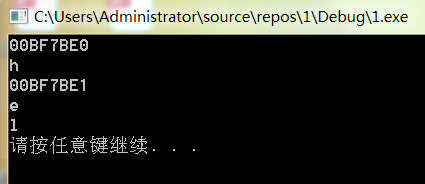A simple introduction to pointers
1. Pointer: A special variable in which the stored value is interpreted as an address in memory.
2. Definition of pointer: Address data type +* + pointer name;
int * ptr; char * ptr; float * ptr;
3. Pointer size: 32-bit platform is 4 bytes, 64-bit platform is 8 bytes;
4. Derivation of pointers: borrow the * operator to refer to the variables indicated by the pointer;
int a = 15;
int * ptr = &a;//Assign the address of a to ptr
* ptr = 10 - *ptr; //Equivalent to a = 10 - a;
printf("%d" , *ptr);//The ptr is de-referenced, i.e. the value of a is printed.
5. Illegal operation:
- Uninitialized pointer derreferences are prohibited.
- NULL pointer can not be accessed;
6.NULL pointer: the pointer points to an empty address
int *ptr = NULL;//The two statements are equivalent. int * ptr = 0;
7. Pointer Constant: Dereference only works for pointer type expressions.
Not at all. Each run assigns a random address.
*(int *)100=25; //Assuming that a variable a is stored at 100 locations, it can be de-referenced only if the pointer type of 100 is strongly changed.
8. Secondary pointer
int a = 15;
int* ptr = &a;
int **c = &ptr;//c Save the address of ptr
printf("%d", **c);//Print a value
9. Operation of Pointer
char *ptr = "hello,world";
printf("%p\n", ptr);
printf("%c\n", *ptr);
printf("%p\n", ++ptr);//Move the pointer position backwards to the char type bit
printf("%c\n", *ptr);
printf("%c\n", *++ptr);//From right to left, first position increases, then dereference

Pointer and Array
The array name represents the address of the first element of the array, and can be used as a pointer.
There are only two exceptions:
- sizeof (array name), representing the size of the entire array.
- & Array name, which represents the first address of the entire array
int a[10],num;
num = sizeof(a) / sizeof(a[0]);
printf("%d\n", num);
printf("%p\n", &a);//Represents the array header address
printf("%p\n", a);
printf("%p\n", &a + 1);//Represents the address of the next array
printf("%p\n", a + 1);

Array pointers: pointers to arrays
int a[10]; int(*ptr)[10] = a;
Pointer array: An array used to store pointers
int *ptr[10];//Store Integer Pointer char *ptr2[10];//Store Character Pointer
Array parametric correlation:
One-dimensional array parameter transfer:
void fun1(int a[]);//Equivalent to int*a void fun3(int *a);//Integer pointer substitution void fun3(int *a[5]);//Integer pointer array substitution
Two-dimensional array parameter transfer:
void fun(int b[][3]);//The first parameter can be omitted and the second can not be omitted. void fun(int ** b);//Second-level pointer for reference void fun3(int (*b)[5]);//Array pointer for two-dimensional array parameter transfer
3. Function pointer
void (* pfun)();//pfun can store the address of the function.
Understand the following code:
void(*signal(int, void(*)(int)))(int);
Simplified code
typedef void(*pfun)(int); pfun signal(int, pfun);
Function pointer array:
Array for storing multiple function pointers
int (*p[4])(int x,int y)={add,sub,mul,chu};
int ret = (*p[2])(x,y);//Call the sub function and pass the return value to ret